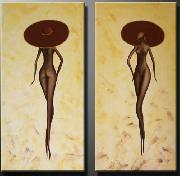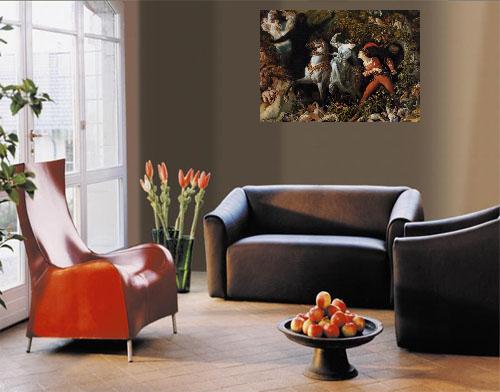|
|
Maclise, Daniel
ID: 62827
A Scene from
new21/Maclise, Daniel-889442.jpg
45 x 61 cm Royal Collection, Windsor The subject is based on a moment in a romantic German novel entitled Undine, written by Friedrich de la Motte Fouque which was first translated into English in 1818 and became almost as popular with artists in England as Goethe's Faust. The incident painted by Maclise occurs in chapter IX, where the young knight, Huldbrand, accompanies his bride, Undine, back home through the forest. The priest, Father Heilmann, who has just performed the marriage ceremony, follows behind and is visible beneath the branch of the tree. Ahead is the dark and sinister apparition, Kuhleborn, the spirit of the waters and the uncle of Undine. Huldbrand draws his sword on Kuhleborn and then strikes him, whereupon the spirit of the waters is transformed into a waterfall. Clearly the painting illustrates the forces of good, represented by the newly married couple, overcoming the power of evil, symbolised by the looming figure of the water god. The narrative element of the picture is aligned on a diagonal, which is contained within a bower populated by elves, goblins and water-nymphs associated with the surrounding forest. The composition is a triumph of design with the main elements of the story formed by an ornamental border of considerable intricacy. Maclise used other such borders for several of his book illustrations including those for The Chimes by Charles Dickens of 1844 and Irish Melodies by Thomas Moore of 1845. Maclise has here relied on German sources for the decorative features, and was clearly influenced by German illustrators. Maclise was of Irish origin and in 1827 he came to London, where he almost immediately gained recognition as a portrait draughtsman, drawing numerous likenesses for Eraser's Magazine. He painted historical and literary subjects, several as frescoes for the Palace of Westminster. Maclise formed close friendships with the novelists Charles Dickens and William Makepeace Thackeray as well as his compatriot, the poet Thomas Moore, and the politician Benjamin Disraeli. With all of these he shared an ebullience of character and a sense of humour, but this later gave way to melancholy and pessimism
Buy Only Oil Painting

|

ORIGINALS
BACK
|
|

